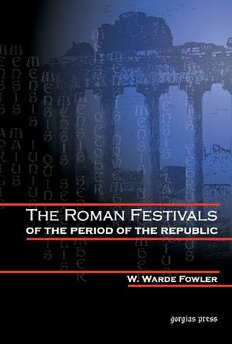
The Roman Festivals of the Period of the Republic PDF
Preview The Roman Festivals of the Period of the Republic
THE ROMAN FESTIVALS OF THE PERIOD OF THE REPUBLIC THE R O M AN F E S T I V A LS 01* THE PERIOD OF THE REPUBLIC AN INTRODUCTION TO THE STUDY OF THE RELIGION OF THE ROMANS BY W. WARDE FOWLER, M.A. FELLOW AND SUB-RECTOR OF LINCOLN COLLEGE, OXFORD GORGIAS PRESS 2004 First Gorgias Press Edition, 2004. The special contents of this edition are copyright €> 2004 by Gorgias Press LLC. All rights reserved under International and Pan-American Copyright Conventions. Published in the United States of America by Gorgias Press LLC, New Jersey. This edition is a facsimile reprint of the original edition published by Macmillan and Co., London, 1908. ISBN 1-59333-003-0 GORGIAS PRESS 46 Orris Ave., Piscataway, NJ 08854 USA www.gorgiaspress.com Printed and bound in the United States of America. FRATRIS FILIIS I . C . H . F H G C . F BONAE SPEI ADOLESCENTIBUS PREFACE A WORD of explanation seems needed about the form this book has taken. Many years ago I became specially interested in the old Roman religion, chiefly, I think, through studying Plutarch's Quaestiones Romanae, at a time when bad eyesight was compelling me to abandon a project for an elaborate study of all Plutarch's works. The ' scrappy' character not only of the Quaestiones, but of all the material for the study of Roman ritual, suited weak eyes better than the continual reading of Greek text; but I soon found it necessary to discover a thread on which to hang these fragments in some regular order. This I naturally found in the Fasti as edited by Mommsen in the first volume of the Corpus Inscriptionum Latinarum; and it gradually dawned on me that the only scientific way of treating the subject was to follow the calendar throughout the year, and to deal with each festival separately. I had advanced some way in this work, when Roscher's Lexicon of Greek and Roman Mythology began to appear in parts, and at once con- vinced me that I should have to do my work all over again in the increased light afforded by the indefatigable industry of the writers of the Roman articles. I there- fore dropped my work for several years while the Lexicon was in progress, and should have waited still longer for its completion, had not Messrs. Macmillan viii PEEFACE invited me to contribute a volume on the Roman religion to their series of Handbooks of Archaeology and Antiquities. Having once set out on the plan of following the Fasti, I could not well abandon it, and I still hold it to be the only sound one: especially if, as in this volume, the object is to exhibit the religious side of the native Roman character, without getting entangled to any serious extent in the colluvies religionum of the last age of the Republic and the earlier Empire. The book has thus taken the form of a commentary on the Fasti, covering in a compressed form almost all the public worship of the Roman state, and including incidentally here and there certain ceremonies which strictly speaking lay outside that public worship. Com- pression has been unavoidable; yet it has been impossible to avoid stating and often discussing the conflicting views of eminent scholars; and the result probably is that the book as a whole will not be found very inter- esting reading. But I hope that British and American students of Roman history and literature, and possibly also anthropologists and historians of religion, may find it useful as a book of reference, or may learn from it where to go for more elaborate investigations. The task has often been an ungrateful one—one indeed of Dipping buckets into empty wells And growing old with drawing nothing up. The more carefully I study any particular festival, the more (at least in many cases) I have been driven into doubt and difficulty both as to reported facts and their interpretation. Had the nature of the series permitted it, I should have wished to print the chief passages quoted from ancient authors in full, as was done by PREFACE IX Mr. Fame 11 in his Cults of the Greek States, and so to present to the reader the actual material on which conclusions are rightly or -wrongly based. I have only been able to do this where it was indispensable: but I have done my best to verify the correctness of the other references, and have printed in full the entries of the ancient calendars at the head of each section. Professor Gardner, the editor of the series, has helped me by contributing two valuable notes on coins, which will be found at the end of the volume: and I hope he may some day find time to turn his attention more closely to the bearing of numismatic evidence on Roman religious history. It happens, by a curious coincidence, that I "am writing this on the last day of the old Roman year; and the lines which Ovid has attached to that day may fitly express my relief on arriving at the end of a very laborious task: Venimus in portum, libro cum mense peracto, Naviget hinc alia iam mihi linter aqua. W. W. F. OXFORD . Feb. a8, 1899
